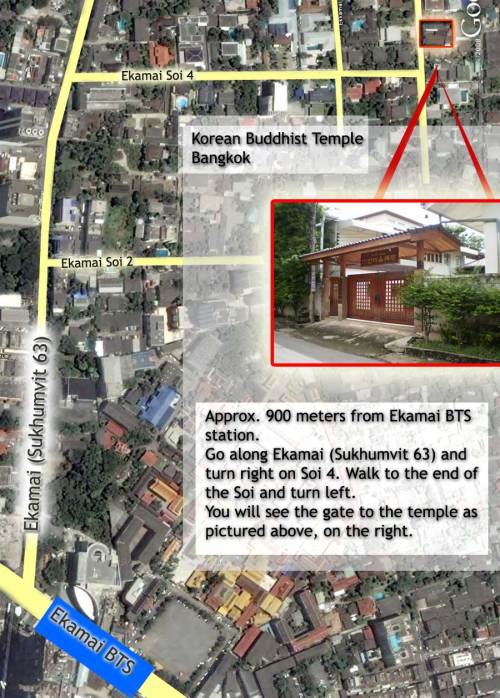The Bangkok Seon Club is an English-language Zen group that meets monthly at the Bangkok Hanmaum Seonwon (One-mind Zen Centre) near Ekamai BTS (map and directions below) to share experiences and study Korean Zen in general, and the teachings of Zen Master Daehaeng Kunsunim in particular.
Meetings are open to all comers interested in Korean Zen, whatever your background in Buddhism or meditation.
Background:
 The Bangkok Hanmaum Seon Center is an overseas branch of Hanmaum Seonwon, established by Seon Master Daehaeng Kunsunim (a female Seon master widely respected throughout Korea) in 1972, and part of the Jogye Order of Korean Buddhism – the largest Buddhist Order in Korea with a history stretching back over 1,200 years.
The Bangkok Hanmaum Seon Center is an overseas branch of Hanmaum Seonwon, established by Seon Master Daehaeng Kunsunim (a female Seon master widely respected throughout Korea) in 1972, and part of the Jogye Order of Korean Buddhism – the largest Buddhist Order in Korea with a history stretching back over 1,200 years.
‘Seon’ by the way, is the Korean word for ‘Zen’, and Master Daehaeng’s teaching is to realize and awaken to our inherent nature, also called Buddha-nature, inherent mind, or Juingong.
Daehaeng Kun Sunim teaches people to
Believe in your foundation, Juingong, and entrust it with everything that confronts you. Then go forward while observing and experimenting with what you experience.
The Bangkok branch of Hanmaum Seonwon was established ten years ago and serves the spiritual needs of Korean residents and visitors in the city. It is very much a centre of the Korean Buddhist community, and many families attend regularly with children of all ages.
The founder does not reside at this branch temple, but it is run by two resident female sunims (monks) who arrange regular ceremonies and teachings.
Our meetings are led by the senior resident Sunim Kun Hyaedan Sunim, who has been ordained for many years, and regular attendees include English-speaking members of the Seon Centre, who kindly and skillfully help with translation, and a number of non-Koreans interested in, and practicing, Seon Buddhism.
A regularly updated group blog written by an American monk in the Hanmaum lineage and four other western Buddhists can be found here: http://wakeupandlaugh.wordpress.com
And an essay specifically on the Bangkok Seon Club with some good pictures can be found on the ‘Wake Up and Laugh’ blog from June 2010, here: http://wakeupandlaugh.wordpress.com/2010/06/10/the-bangkok-seon-club/
Meditation
This Korean lineage differs somewhat from the more well known Japanese Zen schools in meditation style. One surrenders to ones own Buddha-nature (Juingong), a giving up of the self to the natural flow of Dhamma and wisdom. Instructions are given for the formal sitting period at the start of each meeting, so please arrive before time so as not to disturb the sitting.
A few points to note:
- Please try to arrive in plenty of time as the meetings start with a short meditation, and we try to finish at 9pm sharp too.
- There are no bare feet in Korean temples, it would be much appreciated if those wishing to come will remember to bring socks!
- It is a good idea to buy a copy of the book we are studying, ‘No River to Cross’, if you intend to attend regularly. Copies are available at the centre.
- This is a good chance here in Bangkok to study in a Zen Buddhist temple with fully ordained Zen monks in a close and supportive practice group. See you on Saturday!
Location:
The Bangkok Hanmaum Seon Centre
86-1 Soi 4 Sukhumvit 63
BTS Ekamai Station – Exit 1
Take Exit 1 from Ekamai Station, and go down Ekamai Road (aka Sukhumvit 63). Turn right along Soi 4 and go to the end. Turning left you will see the Centre on your right a few meters along.
A motorcycle from Ekamai can also take you there cheaply. Ask for the ‘Wat Gao-lii’ (Korean temple).
Click map for a lager version:
